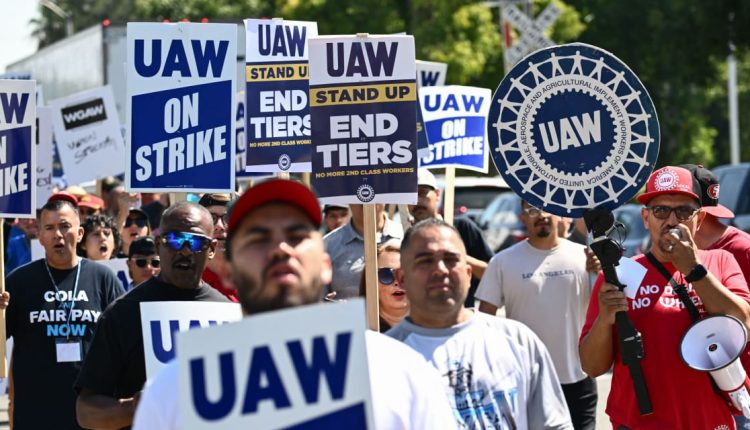The United Auto Workers union is expanding its strike against
General Motors
and
Ford Motor,
targeting one assembly plant at each company. Electric vehicles are central to the escalation.
The targeted strike began on Sept. 15. Instead of a complete walkout, union workers are slowly expanding their effort to extract a better contract from the companies. Unlike the last expansion, when UAW members walked out of parts and distribution facilities across the country owned by GM (ticker: GM) and Chrysler parent
Stellantis
(STLA), Ford (F) was included in this week’s expansion. Stellantis was left out.
The escalation is a sign the union isn’t happy with negotiations, caps what has been a wild week in Detroit.
On Tuesday, Ford paused construction on a battery plant in Michigan. Ford didn’t give specifics on the reason for the pause at the time, but the cost structure of the plant, which would likely be unionized by the UAW, was cited as a reason by CEO Jim Farley on Friday afternoon. He also called extending the strike “grossly irresponsible.”
The UAW, for its part, said it was focused on job security through the EV transition. “I don’t know why Jim Farley is lying about the state of negotiations. It could be because he failed to show up for bargaining this week,” said Fain in an emailed statement. “If he were there, he’d know we gave Ford a comprehensive proposal on Monday and still haven’t heard back.”
The UAW likely wants new battery workers to be paid like assembly-line employees, Deutsche Bank analyst Emmanuel Rosner told Barron’s. That would mean hundreds of millions of dollars in additional labor costs, he estimated, saying Ford, and other auto makers, would prefer if new battery workers were paid on a different wage scale.
GM CEO Mary Barra said the UAW is pitting the companies against one another, and the strategy only helps nonunion competition.
“It is clear Shawn Fain wants to make history for himself, but it can’t be to the detriment of our represented team members and the industry,” Barra said.
Earlier this week, President Joe Biden took to the picket lines and former President Donald Trump spoke at a rally near Detroit. Both kept to their expected talking points—Biden came out to support the union, and Trump warned Biden’s EV policies would hurt the auto industry.
And on Thursday, Fain said in a recorded message posted on X, formerly Twitter, that there were reports of violence against picketers and condemned “this violence that GM and Stellantis is enabling.”
Stellantis said it was appalled by the UAW’s characterization of incidents on picket lines. “The companies are not the enemy and we are not at war,” it said. “We respect our employees’ right to advocate for their position, including their right to peacefully picket.”
GM said safety is its top priority and it cares deeply about the well-being of its team members and the community. “Shawn Fain’s false accusations regarding recent picketing safety incidents is just another example of prioritizing inflammatory rhetoric over serious efforts to reach an agreement for the benefit of our team members,” the company said.
Fain’s Friday update was “all about Ford,” according to Benchmark analyst Mike Ward. He said he had been hopeful the union and Ford could soon reach a settlement, but that the union’s latest action likely will delay that. The union chose to walk out of the Ford Chicago Assembly Plant that makes Explorer SUVs.
That is a potentially big blow to Ford. In 2023, Ford has sold 121,659 Explorers in the U.S. through August, about 9% of Ford’s total sales in America. Explorer is Ford’s second-best-selling model behind F-150 trucks.
Ford stock fell 1.1% Friday. The
S&P 500
and
Dow Jones Industrial Average
were down 0.3% and 0.5%, respectively.
GM stock was down 0.6%. The UAW is walking out of GM’s Lansing Assembly facility where the company produces Chevy Traverse and Buick Enclave vehicles.
Stellantis shares were down 0.6% Friday.
With Friday’s expansion, about 25,000 UAW workers will be on strike against the Detroit Big Three auto makers. That is about 17% of total UAW members.
Ford and GM shares are down about 17% and 14%, respectively, since the start of July when labor issues came to the fore. The
S&P 500
is down about 4% over the same span.
Stellantis stock is up 9%, partly because the company is more global, with headquarters in Europe. It is also a cheaper stock, trading for less than 4 times estimated 2024 earnings. GM and Ford shares trade for less than 5 times and 7 times, respectively.
The shares are likely stuck until parties reach a resolution.
“I’m not super optimistic around the outcome of these negotiations,” added Rosner. “The UAW is set on getting what they have asked for, they’re positioning themselves for a long strike.”
One way the UAW has done that is by limiting the number of workers on strike, which in turn limits the burden on the UAW strike fund.
The union has come down in its ask for wage increases over the life of the contract. Initially, the group asked for a 40% increase; now, members are pushing for an increase in the range of 30%. The auto makers are offering closer to 20%. Both sides are cagey about deal specifics.
“[Ford, GM, and Stellantis are] doing incredibly well,” Fain said. “And guess what? We should be doing incredibly well.”
The union also wants to end wage tiers, a concession won by the auto makers during the 2008-2009 financial crisis. Tiers provide a lower wage for newly hired workers in certain jobs.
Write to Al Root at [email protected]
Read the full article here

